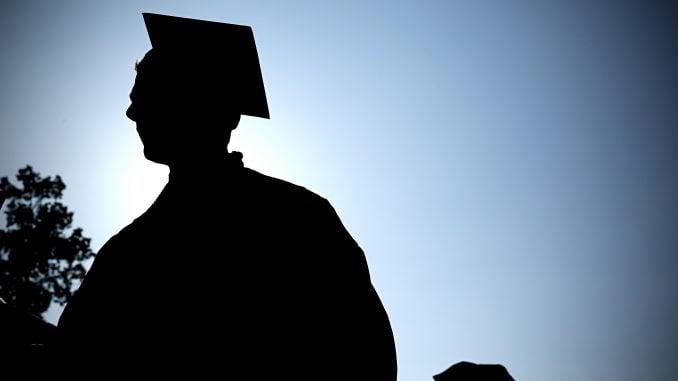
This spring brought news of another record year of giving to American colleges. In 2017, donations to colleges and universities topped $43.6 billion. The surging U.S. stock market enabled renewed charitable giving by alumni. There were five gifts of $100 million or more. As usual, Harvard and Stanford led the pack with $1.3 billion and $1.1 billion, respectively. The Wall Street Journal’s analysis showed that “much of the increase in giving last year can be attributed to alumni activity. Gifts from school graduates jumped 14.5 percent last year.”
This news prompted me to recall a watershed event from 67 years ago. In 1951, a young Yale graduate, William F. Buckley, Jr., shook the academic world with the publication of “God and Man at Yale.” In addition to launching the author’s national career and the 20th-century conservative movement, this bestselling little book forecast with remarkable accuracy the future of American higher education.
Buckley clearly perceived that Yale — and most of American higher education at that time — was actively undermining what he called “the public welfare.” He saw belief in Christian values and free-market capitalism as the foundation upon which America had been built. As a student, Buckley had become convinced that the elites at Yale preferred openness and relativity to Christianity and conservatism. They promoted government control instead of free markets and capitalism. Buckley wrote, “The duel between Christianity and atheism is the most important in the world … and the struggle between individualism and collectivism is the same struggle reproduced on another level.” He was among the very first to discern this trajectory in American higher education.
Yale and the American academic community reacted with disdain and acrimony. Blistering attacks from McGeorge Bundy, A. Whitney Griswold, Frank Ashburn, Henry Sloane Coffin and others labeled Buckley a “young Nazi” and challenged his scholarship. In his lengthy article in the Saturday Review, Ashburn charged, “This book is one which has the glow and appeal of a fiery cross on a hillside at night. There will undoubtedly be robed figures who gather to it, but the hoods will not be academic. They will cover the face.” Buckley did evince some support from conservatives and from concerned Yale alumni, but the intellectual elites made every effort to bury his argument under a torrent of criticism. As Dwight Macdonald commented, “[Yale’s leaders] reacted with all the grace and agility of an elephant cornered by a mouse.”
Although Buckley wrote “God and Man at Yale” in the midst of the Cold War, he foresaw an ongoing battle between collectivism and capitalism that would continue beyond the defeat of communism. Indeed, the threats which Buckley exposed remain deeply entrenched in American intellectual circles today. Similarly, Buckley’s philosophy of Christian individualism still remains just as much at the core of American conservatism as it was in 1951.
Recent examples of this ongoing battle abound. Student disruption of Charles Murray’s speech at Middlebury, demands to remove the Haystack Monument (erected in 1867 to honor Christian missionaries) at Williams College, and the harassment of law professor Amy Wax at University of Pennsylvania are but a few.
For anyone reading “God and Man at Yale” today, there are several clear takeaways. Regardless of one’s own political views, one cannot help but be impressed that this book was written by a 21-year-old. The quality of Buckley’s writing and analysis is remarkable — especially for someone his age.
Secondly, in retrospect, Buckley was obviously right. He correctly perceived the thrust of American education long before most of his fellow citizens and warned prophetically of the corrosive future consequences. Indeed, the leftward shift of American higher education has proven more pervasive and more aggressive than even Buckley imagined.
Thirdly, today’s reader is struck by the compelling simplicity of Buckley’s antidote. College alumni should exercise their right of governance. To the outrage of educators, Buckley wrote, “the responsibility to govern Yale falls ultimately on the shoulders of her alumni.” Alumni should exercise their prerogative, and, if educators are unresponsive, alumni should discontinue their financial support. He wrote: “If the majority of Yale graduates believe in spiritual values and in individualism, they cannot contribute to Yale so long as she continues in whole or in part to foster contrary values.”
Sadly, Buckley’s exhortation to alumni has been widely ignored. Alumni contributions have poured into American colleges at levels unimagined by Buckley in 1951. Colleges are awash with funds as never before, and educators feel little or no obligation to submit to alumni concerns. How is it that Buckley could have written so presciently about the trajectory of American higher education, yet alumni failed so miserably to follow his good advice?
When the development officer at your alma mater calls, think of Buckley’s wise counsel before you write the check.
Garland S. Tucker III is the Retired Chairman/CEO of Triangle Capital Corporation, author of “Conservative Heroes: Fourteen Leaders Who Changed America — Jefferson to Reagan,” and senior fellow at the John Locke Foundation.



